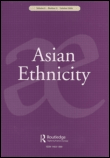
Asian Ethnicity
Scope & Guideline
Illuminating the complexities of migration and identity.
Introduction
Aims and Scopes
- Cultural Identity and Ethnicity:
The journal extensively covers how cultural practices, traditions, and narratives contribute to the formation and transformation of ethnic identities across Asian societies. - Migration and Transnationalism:
A significant focus is placed on the experiences of migrant communities and how their identities are negotiated in host countries, including issues of belonging, integration, and cultural preservation. - Political Dynamics and Ethnic Governance:
The journal addresses the complexities of ethnic politics, including citizenship, rights, and policies that affect ethnic minorities, often contextualized within broader national and regional frameworks. - Intersectionality of Gender and Ethnicity:
Research often examines how gender intersects with ethnicity, impacting social roles, identity formation, and the experiences of ethnic minorities, particularly women. - Historical and Colonial Perspectives:
The journal contributes to understanding contemporary ethnic issues through historical lenses, analyzing colonial legacies and their ongoing impacts on ethnic relations and identities. - Indigenous Studies:
A core area of interest is the exploration of indigenous identities, rights, and cultural practices, often highlighting the struggles and resilience of indigenous communities in contemporary society.
Trending and Emerging
- Climate Migration and Ethnicity:
A growing number of studies are exploring the intersections between climate change, migration, and ethnic identities, highlighting how environmental factors influence migration patterns and community resilience. - Ethnic Minorities and Digital Media:
Research is increasingly focusing on how digital media shapes ethnic identities and community engagement, particularly among younger generations, as they navigate their identities in a globalized digital landscape. - Intersection of Religion and Ethnicity:
There is an emerging trend in examining how religious beliefs and practices influence ethnic identities and community dynamics, particularly in multi-religious societies. - Youth and Ethnic Identity Formation:
Studies are beginning to emphasize the role of youth in negotiating and reshaping ethnic identities, particularly in urban settings where diverse cultures intersect. - Postcolonial Perspectives on Ethnicity:
A noticeable trend is the application of postcolonial theories to analyze ethnic identities, addressing the legacies of colonialism and their impacts on contemporary ethnic dynamics. - Translocality and Ethnic Belonging:
Research is increasingly exploring the concept of translocality, focusing on how ethnic identities are maintained and transformed across different geographical spaces, reflecting global migration trends.
Declining or Waning
- Traditional Ethnic Stereotypes:
There seems to be a declining focus on reinforcing traditional ethnic stereotypes, with a shift towards more nuanced discussions that challenge simplistic categorizations and representations of ethnic groups. - Singular National Narratives:
The journal is moving away from publications that primarily present a singular national narrative of ethnicity, instead favoring comparative and transnational perspectives that reflect the complexity of ethnic identities. - Homogenized Ethnic Categories:
There is a noticeable decline in studies that treat ethnic categories as monolithic, with more emphasis now on intra-group diversity and the dynamics of ethnic identification. - Historical Ethnocentrism:
Research that solely relies on ethnocentric historical narratives is becoming less prevalent, as the journal increasingly values interdisciplinary approaches that incorporate diverse perspectives.
Similar Journals

REVUE HISTORIQUE
Illuminating the Path of Historical InquiryREVUE HISTORIQUE is a distinguished scholarly journal dedicated to the field of history, published by PRESSES UNIV FRANCE. With an ISSN of 0035-3264 and an E-ISSN of 2104-3825, this journal has been a vital resource for historians and academics since its inception, exploring various dimensions of historical research and discourse. The journal is currently categorized in the Q3 quartile for history according to the 2023 metrics, highlighting its significance and academic rigor, although it is rated in the 19th percentile in the Scopus Ranks among Arts and Humanities journals. Based in France, the journal encompasses a wide range of historical topics and serves as a platform for innovative research, critical analysis, and scholarly discourse, making it an essential read for anyone looking to deepen their understanding of the past. Researchers, professionals, and students alike will benefit from its comprehensive articles, which reflect the latest trends and developments in historical research. As a non-open access journal, subscribers and institutional access are essential to engage with its rich content.
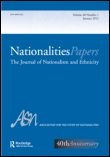
Nationalities Papers-The Journal of Nationalism and Ethnicity
Challenging Perspectives on Nationalism and Cultural DynamicsNationalities Papers - The Journal of Nationalism and Ethnicity, published by Cambridge University Press, stands as a pivotal forum dedicated to exploring the intricate dynamics of nationalism, ethnicity, and cultural identity in a global context. With an impact factor in the upper echelons of academia, the journal is classified within the Q1 category for both History and Political Science and International Relations, and Q2 in Geography, Planning and Development as of 2023. This esteemed journal, originating in the United Kingdom, has a rich history since its inception in 1972, continuously evolving to address contemporary issues surrounding national identity and ethnic tensions. It ranks impressively among other publications in its fields, evidenced by its notable Scopus rankings in multiple disciplines. Researchers, professionals, and students alike benefit from the journal's rigorous peer-reviewed articles which not only enhance scholarly discourse but also provide actionable insights into real-world phenomena. While it operates under a traditional access model, the essential contributions made by Nationalities Papers ensure it remains a crucial resource for anyone engaging in the study of nationalism and ethnicity globally.
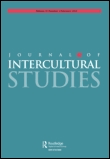
Journal of Intercultural Studies
Advancing Knowledge in Intercultural EngagementWelcome to the Journal of Intercultural Studies, a premier publication in the fields of Cultural Studies, History, Sociology, and Political Science, brought to you by Routledge Journals, Taylor & Francis Ltd. With an impressive Q1 ranking in both Cultural Studies and History, as well as a solid performance in Sociology and Political Science, this journal stands as a vital resource for researchers, academics, and students seeking to explore the complexities of intercultural engagement and historical narratives from 1980 to 2024. Indexed in Scopus with high percentiles, the journal not only contributes to scholarly discourse but also facilitates access to a diverse range of interdisciplinary insights. While it currently does not offer open access, its comprehensive studies and authoritative articles are indispensable for those committed to understanding the nuances of cultural interactions and their societal implications.

IDENTITIES-GLOBAL STUDIES IN CULTURE AND POWER
Advancing Understanding of Culture in a Globalized WorldIDENTITIES: Global Studies in Culture and Power, published by Taylor & Francis Inc, is a distinguished academic journal dedicated to the exploration of cultural identities within a global context. With its ISSN 1070-289X and E-ISSN 1547-3384, this journal has established itself as a key platform for scholars interested in the intersections of culture, power, and identity since its inception in 1994. As a premier Q1 journal in the fields of Anthropology, Arts and Humanities, and Cultural Studies, it ranks highly among its peers, holding notable positions such as #69 in Social Sciences – Cultural Studies and #45 in Social Sciences – Anthropology, reflecting its influence and relevance in contemporary academic discourse. While the journal operates under a subscription model, it remains committed to presenting high-quality, peer-reviewed research that contributes to our understanding of global identities. Its critical analyses and theoretical advancements make it an invaluable resource for researchers, professionals, and students who aim to delve into the complexities of culture and power dynamics in today's world.

International Journal of Taiwan Studies
Empowering Scholars to Navigate Taiwan's Complex LandscapeInternational Journal of Taiwan Studies, published by BRILL, stands at the forefront of scholarly research on Taiwan, encompassing a broad spectrum of disciplines including Anthropology, Cultural Studies, History, Political Science, and more. With an ISSN of 2468-8797 and an E-ISSN of 2468-8800, this journal serves as a vital platform for researchers and professionals to explore Taiwan's multifaceted identity and its implications on contemporary global issues. As of 2023, it holds a commendable position within academic ranks, reflecting its impact with quartiles ranging from Q1 to Q3 across several categories. The journal is particularly noted for its contributions to Visual Arts and Performing Arts, ranking in the 85th percentile within the field. With its potential for open access options and commitment to innovative scholarship, the International Journal of Taiwan Studies is an invaluable resource for those seeking to deepen their understanding of Taiwanese society, culture, and politics, while engaging with an ever-evolving scholarly conversation.
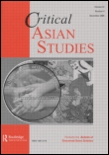
CRITICAL ASIAN STUDIES
Exploring the Dynamics of Asia's ComplexitiesCRITICAL ASIAN STUDIES is a leading academic journal published by Routledge Journals, Taylor & Francis Ltd, dedicated to exploring the complex social, cultural, and political dynamics of Asia. With an ISSN of 1467-2715 and an E-ISSN of 1472-6033, this journal serves as an essential resource for researchers and professionals interested in Asian studies, sociology, and geography. Boasting an impressive Q2 ranking in both Geography, Planning and Development, and Sociology and Political Science for 2023, it is recognized for its influential contributions to these fields. The journal’s accessibility options further enhance its appeal, allowing broader dissemination of critical research findings. Established in 1968 and continuing its rigorous publication through to 2024, CRITICAL ASIAN STUDIES facilitates in-depth dialogue and scholarship, thus playing a vital role in advancing understanding of Asian issues on a global scale.
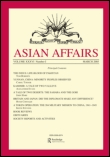
Asian Affairs
Illuminating Asia's Role in the Global ArenaAsian Affairs is a distinguished academic journal published by Routledge Journals, Taylor & Francis Ltd., specializing in multifaceted research related to the dynamic socio-economic and political landscape of Asia. Established in 1995, this journal offers a platform for scholars and practitioners to disseminate impactful research that covers key areas including Economics, Geography, Law, and Political Science, achieving notable recognition with a 2023 category ranking of Q2 in Law and Q3 in other pertinent fields. With an ISSN of 0306-8374 for print and 1477-1500 for e-publication, it ensures wide accessibility to cutting-edge articles, despite not being an open access journal. Located in the United Kingdom, Asian Affairs continues to serve as a vital resource for researchers, professionals, and students seeking to deepen their understanding of Asia's global impact through rigorous analysis and innovative insights. Readers can expect a commitment to quality and scholarly excellence therein, as evidenced by its impressive Scopus ranking in the social sciences disciplines.

JOURNAL OF AMERICAN ETHNIC HISTORY
Decoding the Layers of American Ethnic HeritageThe Journal of American Ethnic History, published by the University of Illinois Press, serves as a vital platform for interdisciplinary dialogue and research within the fields of history, anthropology, and cultural studies. With its ISSN 0278-5927 and E-ISSN 1936-4695, this esteemed journal has been contributing to scholarly discourse since 1989 and continues to be a significant resource for understanding the complexities of ethnic identity and experience in the United States. Its relevance is underscored by its rankings within the Q3 category for Anthropology and Cultural Studies and a commendable Q2 in History as of 2023. With a Scopus ranking of #684 in History and #655 in Cultural Studies, the journal reflects an impactful engagement with contemporary issues surrounding ethnicity and race relations. Although not open access, researchers and professionals who subscribe will find in-depth studies, critical analyses, and thought-provoking contributions that are essential for those who seek to explore the historical dimensions of American ethnic identities.
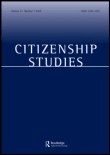
Citizenship Studies
Advancing Insights in Civic Engagement and InclusionCitizenship Studies is a premier academic journal that focuses on the multidimensional analyses of citizenship, belonging, and social inclusion within the realms of Geography, Planning and Development and Political Science and International Relations. Published by ROUTLEDGE JOURNALS, TAYLOR & FRANCIS LTD, this esteemed journal has garnered a remarkable reputation, achieving Q1 ranking in both its categories and earning its place in the top 83rd percentile of Political Science and International Relations publications according to Scopus metrics. With its extensive publishing history from 1997 to 2024, the journal features rigorous research articles, theoretical developments, and critical reviews that catalyze discussions on current global citizenship issues. Although it does not currently offer Open Access, Citizenship Studies remains indispensable for researchers, practitioners, and students who seek to deepen their understanding of citizenship dynamics in a rapidly evolving world. The journal's insightful contributions are vital for developing policies that promote civic engagement and inclusivity in diverse societies.

New Contree
Illuminating the Socio-Political Dynamics of the PastNew Contree is a prominent academic journal published by the Department of History at the University of North West, dedicated to the exploration of historical studies in Southern Africa and beyond. Featuring an ISSN of 0379-9867, this Open Access journal since 2022 allows for unrestricted access to scholarly articles, promoting the dissemination of knowledge and fostering collaborative research within the historical community. The journal serves as a critical platform for researchers, professionals, and students, aiming to contribute significantly to the understanding of socio-political dynamics, cultural heritage, and historical narratives in the region. With its commitment to academic rigor and accessibility, New Contree establishes itself as an essential resource for those eager to explore and engage with the past in innovative ways.